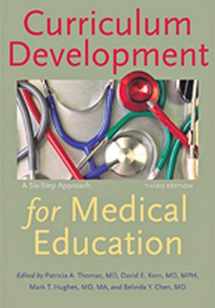
Curriculum Development for Medical Education: A Six-Step Approach
Book details
Summary
Description
The third edition of this invaluable text reflects significant changes driving curriculum development and renewal throughout medical education.
Based on a proven six-step model and including examples and questions to guide application of those timeless principles, Curriculum Development for Medical Education is a practical guidebook for all faculty members and administrators responsible for the educational experiences of medical students, residents, fellows, and clinical practitioners.
Incorporating revisions driven by calls for reform and innovations in medical education that challenge established teaching models, the third edition includes an awareness of new accreditation standards and regulatory guidelines. The authors have expanded their discussion of survey methodology for needs assessment and stress the importance of writing competency-based goals and objectives that incorporate milestones, entrustable professional activities, and observable practice activities. With updated examples focusing on interprofessional education, collaborative practice, and educational technology, they describe educational strategies that incorporate the new science of learning. A completely new chapter presents the unique challenges of curriculum development for large, long, and integrated curricula.


We would LOVE it if you could help us and other readers by reviewing the book
Book review



